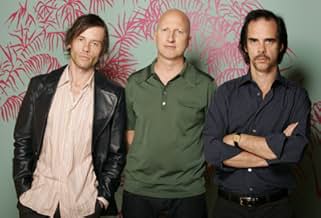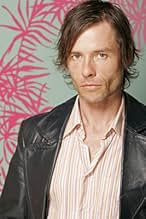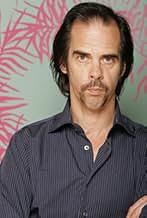The Proposition
A lawman apprehends a notorious outlaw and gives him nine days to kill his older brother, or else they'll execute his younger brother.A lawman apprehends a notorious outlaw and gives him nine days to kill his older brother, or else they'll execute his younger brother.A lawman apprehends a notorious outlaw and gives him nine days to kill his older brother, or else they'll execute his younger brother.
- Awards
- 14 wins & 30 nominations total
- Director
- Writer
- All cast & crew
- Production, box office & more at IMDbPro
Featured reviews
Nick Cave's script is shot through with his signature dark poetry; it translates wonderfully onto the screen. Guy Pearce, Ray Winston and Danny Huston put in powerful performances. Emily Watson is also superb but somehow this film seems to be more about men than women and so her performance feels a little isolated from the rest of the movie.
The film is a strangely skewed morality tale crossed with a tale of the absurd. There is something so absurd about Captain Stanley's English breakfast and standard roses in the hot, fly-blown wastelands of the movie, and off course there is something so absurd about how violent humans beings are to each other. Despite all the violence though, some of which is stomach-turning, this movie has some moments of great tenderness and elegy.
The plot summary and the advertising seemed to offer some form of thriller but in reality the film delivers something altogether more interesting and memorable. Set in the Australia outback where settlements are being born and laws being established, the film charts the moral complexities of the good and bad in the story while painting a beautifully bleak backdrop of open space and bloody, pointless violence. It is not an easy film to watch and certainly not one to expect to come out of laughing or feeling good about things. Nor is it a film to go into expecting a traditional plot because it is this area where the film is at its weakest because it is not a "this happened, this happened then that happened" sort of story. This is not to say it is boring but it does require patience for the casual viewer. Personally I found most scenes to be interesting but most admit that the narrative kind of hangs around rather than moving forward firmly in one direction.
The substance is more in the characters than in the narrative and on this level it was engaging. Although the posters and summary will tell you this is about the Burns brothers, it is as much if not more about Stanley and his wife. It is he would has the duality of trying to defeat violence by encouraging it while also heaving under the burden of trying to take this job entirely on his own shoulders while protecting his wife from knowing anything about the real world out in the desert. It is an interesting thread and for my money it was the thrust of the story the issue of what Charlie will do is actually part of Stanley's story rather than the other way around. With this as the story the film is much better because it does paint a convincing tale around this. The Burns brothers thread is still interesting but less is done with it with Arthur himself being very little more than an enigmatic plot device.
Style wise the film is fantastic as it delivers a bleakly convincing picture of the birth of Australia. The landscape is beautifully filmed and, although Cave could have done more as writer, his contribution to the soundtrack is as welcome as it is well used. The sudden moments of violence are uncomfortable and difficult to watch. They are delivered in visceral moments of gore that are bereft of any touches that would glamorise the death; here it is horrible and full of flies. Of course you are right to note that a hauntingly stylish delivery should not be taken as a replacement for substance but I think it has just about enough of the latter and an abundance of the former to carry the film as a whole.
The cast are mixed but nobody really turns in a bad performance. Winstone dominates the film with easily the best performance and the most interesting character. His Captain Stanley wears every decision and Winstone allows us to see the effect this country has had on his soul. Watson is also good, simple at first but touched by the violence that her husband cannot defend her from. Pearce is an astute and subtle actor who keeps the audience with his thread even though it is less interesting; however Huston is not used as well as he deserved. He gives a memorable performance but his character is never more than an action waiting to happen. Wilson is convincingly young and his flogging is difficult to stomach, while Hurt turns up in a nice cameo as a bounty hunter. As much as the performances though, the film is about atmosphere, and Hillcoat has done a great job in producing a desolate film that is as beautiful as it is disheartening.
An imperfect film due to the lack of a strong narrative, this is still a memorable affair for many reasons. It looks great, has a great use of music and produces a haunting desolation in the country and the characters. Not a fun night out by any means but for what it is, it is well worth seeing.
Captain Stanley goes after the murderous Burns brothers by setting them against each other. His proposition is that middle brother Charlie kill older brother Arthur, in order to save younger brother Mike from the noose. It is expedient justice but also astute psychology on Stanley's part; Charlie seems less than reluctant to take on the task of dispensing with his charismatic but psychotic older sibling.
Stanley's mantra is that he will civilize this land, but his failing is in choosing the wrong target. His treacherous sergeant, feeble superior, and uptight wife together conspire through ignorance and fear to undo the Captain's intent. When Mike is flogged beyond reason and physical endurance, the Captain's moral argument is won, but perhaps at the price of all their lives, as the Burns brothers come seeking vengeance.
Pearce adds impressively to his CV, in an understated but powerful performance as the brooding middle brother. Stanley is not exactly a good guy, but as much on the side of good as it is possible to be in this God-forsaken landscape. It has taken a while to get used to Winstone in such roles, starting with Sexy beast, but he is wearing them with aplomb now. Danny Huston is a pleasant surprise as the educated but deranged Arthur, while John Hurt revels in playing against type. Emily Watson, never less than excellent, embodies the prim Victorian. My own first impression of Australia was flies, flies, flies, and Hillcoat captures this. The question is not why there are so many flies in this film, but why they are curiously absent from other Australian films. They are both a metaphor for the squalor and decay that infest existence, and an acutely observed detail of the arena.
Before the British, other Europeans famously arrived in Australia but considered the landscape uninhabitable. Threaded through The Proposition is the suggestion that they were right.
The broader reference is the existence of our dark side, embodied in Arthur, a Kurtz-like figure, a god-like presence in an inhospitable landscape, facing an assassin dispatched from a 'civilization' that does not like what he reminds them of. The film references Conrad's infamous tale but anchors it in this universal tale of white men's ill-fated attempts to conquer a land where they do not belong. The aborigines tolerate them, or despair of them. "Strange, you whities" says Jacko, while house servant Tobey shows his role as subservient ends at the garden gate, where he leaves his boots and returns to his barefoot roots. Two Bob simply abandons his white mates at the end. Like the land, their attitudes to these invaders range from indifferent to hostile.
The Proposition is less poetic violence than violent poetry. Too much to take in here in one viewing, in time to come this might just match Walkabout as the masterpiece of Australia-set cinema.
Directed by Brisbanite John Hillcoate from a script by Aussie indie icon Nick Cave, this film has some of the most gorgeous photography of the Australian outback ever committed to film, showcasing it's unique desolate beauty in it's dust, flies and exquisite sunsets.
Hillcoate assembles a very fine ensemble cast, most notably Ray Winstone as Captain Stanley and Guy Pearce as Charlie Burns - two actors performing at the top of their game. Danny Huston is effective as Arthur Burns, a man whose serene exterior belies his vicious temperament. Other performers include Emily Watson and John Hurt, as well as fine Australian talent David Wenham, Leah Purcell, Tommy Lewis and quintessential movie aborigine David Gulpilil. All performances are excellent.
Despite it's high violence quotient, the film has an admirable lack of moralistic tone. There are no obvious good guys and bad guys, all the characters are shades of grey possessing both positive and negative attributes, although some characters may lean one way or the other. In particular, Captain Stanley has a good heart though history may judge his methods of justice with contempt, and Charlie Burns has a fierce sense of loyalty and honour but his associated family ties have led him to commit horrific crimes. Even Captain Stanley's wife, Martha, in all her Victorian innocence and naivety, has a dark side to her soul; an attribute which will further propel all towards their destinies.
It's strong subtext of white colonialists' condescending treatment of the aboriginal population puts this film in fine company with other Australian indigenous-themed films such as Fred Schepisi's The Chant Of Jimmy Blacksmith, Nicholas Roeg's Walkabout, Rolf de Heer's The Tracker and Phillip Noyce's Rabbit Proof Fence. The Proposition is the best of these. This is a big call, I know, but the fact is that none of those other very fine Australian films possess the tension which so completely permeates Hillcoates' picture. This film represents a major achievement for both Hillcoate and Cave and is the best Australian film to leave these shores since Ray Lawrence's Lantana.
8.5 out of 10.
Slick. :cool:
"The Proposition" (2005) is a Western that takes place in Australia, yet it's far from a typical Western. The filmmaking, cinematography, actors, locations, soundtrack and editing are top-of-the-line with a surreal, haunting edge. As my title blurb suggests, there are similarities to "Heart of Darkness" and the original "Apocalypse Now," although it fails to achieve the greatness of the latter.
The story plays out in a realistic manner with long stretches of drama and bleak landscapes interspersed with flashes of extreme violence. Ray Winstone and Guy Pearce are great as the two main protagonists. Capt. Stanley understandably wants to rid the land of the brute outlaws, whereas Charlie seeks redemption for himself and his little brother.
Danny Huston is captivating as the focal point and villain, Arthur Burns. Yet he's not a villain in the cliched sense and he's not one-dimensional. He loves the beauty of God's creation, he loves the art of language and he's a mystic of sorts, but he clearly crossed the line at some point in his outlaw endeavors and now must be wiped off the face of the planet. Will Charlie do it?
My only criticism is that the film seems too short at 1 hour, 44 minutes. It needed more time for details and character development. As it is, we sort of have to guess the details, which isn't necessarily a bad thing. I just wish the film would have gone the route of "Apocalypse Now" and given us more definition and development.
At the end of the day, this is one of those films that gets better with repeat viewings, as long as you like the approach of films like "Apocalypse Now," just way shorter (too short). I would love to see a Director's Cut that adds about 20-45 minutes.
It was shot in Winton, Queensland, which is in the northeast Outback of Australia.
GRADE: B+
Did you know
- TriviaIn a 2018 interview, Guy Pearce said that this is his favorite of all of the movies he's ever done.
- GoofsAlthough the story takes place in the 1880s, Jellon sings "Danny Boy" - which wasn't published until 1913.
- Quotes
Jellon Lamb: Forgive me, sir, but I've been stuck here with no one but this sorry sack of Hibernian pig shit for conversation. Poor, poor Dan O'Reilly. Sit, sir. Drink with me.
[Charlie cocks his gun and points it to Lamb]
Charlie Burns: One more crack about the Irish, Mr. Lamb, and I'll shoot you. Am I clear?
Jellon Lamb: Oh, as the waters of Ennis, sir. Let us drink, then, to the Irish. No finer race of men have ever... peeled a potato.
[Charlie cocks his gun again and points it to Lamb]
Charlie Burns: Do you pray, Mr. Lamb?
- Crazy creditsThe opening credits are shown first against a background of period photographs of Australia, which after a time become photographs of the actors/characters, locations and scenes in the film. The end credits are similarly displayed, but only period photographs are used. This is of special note in view of the noted disclaimer, since some indigenous aboriginal groups can be offended by such images.
- SoundtracksThere Is a Happy Land
(1850)
Traditional
Music by Leonard P. Breedlove (uncredited) (1850)
Words by Andrew Young (1838)
Arranged by Nick Cave and Warren Ellis
- How long is The Proposition?Powered by Alexa
Details
Box office
- Budget
- $20,000,000 (estimated)
- Gross US & Canada
- $1,903,434
- Opening weekend US & Canada
- $32,681
- May 7, 2006
- Gross worldwide
- $5,048,893
- Runtime
- 1h 44m(104 min)
- Color
- Sound mix
- Aspect ratio
- 2.39 : 1







































